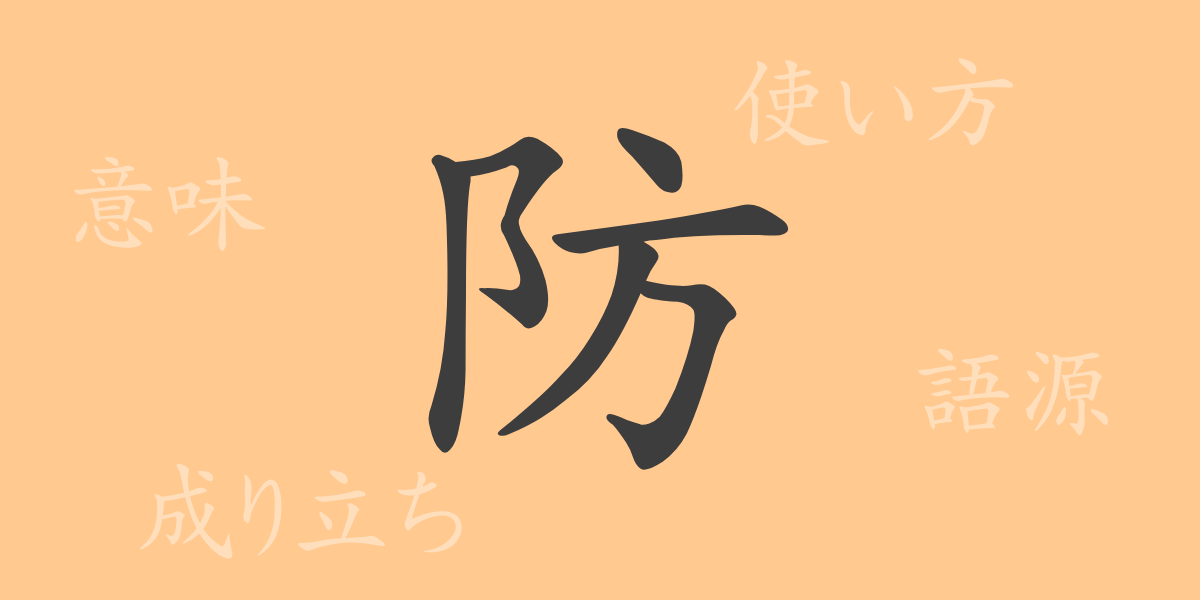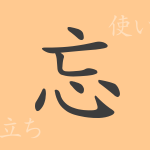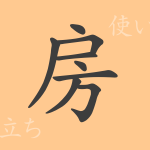In the Japanese language, there are numerous kanji (Chinese characters), each with its own unique history and meaning. The commonly used kanji (kanji) “防” (ぼう, bou), frequently seen in daily life, is no exception. In this article, we will delve into the origins, meanings, usages, readings, and commonly used compounds and idioms of “防” (ぼう, bou). Let’s explore the world of “防” (ぼう, bou), an indispensable character in our lives from security to health management.
The Origin of 防 (ぼう, bou)
The kanji (kanji) “防” (ぼう, bou) was originally used in ancient China to mean defense or embankment. It is derived from pictographs representing embankments to protect land from flooding or walls to defend against enemies. The character comprises the upper part “阜” (ふ, fu), which means land or embankment, and the lower part “方” (ほう, hou), indicating direction or area. This combination forms the concept of protecting land, hence the idea of defense or protection.
Meaning and Usage of 防 (ぼう, bou)
The primary meanings of “防” (ぼう, bou) include to protect, prevent, and guard against. This kanji (kanji) is used to denote actions taken to protect against diseases, disasters, crimes, and various kinds of harm. For example, “防犯カメラ” (ぼうはんカメラ, bouhan kamera) refers to cameras used to prevent crimes, “感染症を防ぐ” (かんせんしょうをふせぐ, kansen shou wo fusegu) means to prevent the spread of diseases, and “防災訓練” (ぼうさいくんれん, bousai kunren) refers to drills to protect oneself from disasters. These usages represent concepts essential for living safely and healthily.
Reading, Stroke Count, and Radical of 防 (ぼう, bou)
In Japanese, the basic readings of the kanji (kanji) “防” (ぼう, bou) are as follows: the on-yomi (Chinese reading) is “ボウ” (ぼう, bou), and the kun-yomi (Japanese reading) can be “ふせ.ぐ” (ふせぐ, fusegu). The kanji (kanji) has 7 strokes, and its radical is “阜” (こざとへん, kozato hen) or “阝” (こざとへん, kozato hen).
- Reading: On-yomi – ボウ (ぼう, bou), Kun-yomi – ふせ.ぐ (ふせぐ, fusegu)
- Stroke Count: 7 strokes
- Radical: 阜 (こざとへん, kozato hen)
Compounds, Idioms, and Proverbs Using 防 (ぼう, bou) and Their Meanings
There are many compounds, idioms, and proverbs that include “防” (ぼう, bou), each with its unique meaning or nuance. For example, “防犯” (ぼうはん, bouhan) means crime prevention, “防波堤” (ぼうはてい, bouhatei) refers to structures that mitigate the force of waves, and “予防接種” (よぼうせっしゅ, yobou sesshu) means vaccination to prevent diseases in advance. Additionally, the proverb “防ぐに足らず” (ふせぐにたらず, fusegu ni tarazu) means that trying to prevent something is futile. These words remind us of the importance of defense and prevention.
Summary of 防 (ぼう, bou)
The kanji (kanji) “防” (ぼう, bou) represents concepts deeply rooted in our daily lives. From crime prevention to disaster preparedness and health prevention, this character symbolizes actions and thoughts aimed at ensuring safety and security. Through its origins, usage in Japanese, readings, and related compounds and idioms, we have understood the richness of the meanings embedded in “防” (ぼう, bou). It is essential to continue applying the profound wisdom and guidance contained in this kanji (kanji) in our daily lives.
“`

























